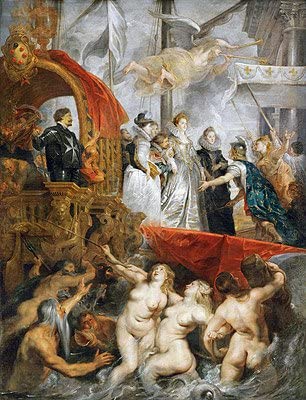La fève
Maurice Donnay (1859-1945)
On Twelfth Night, the French enjoy 'la galette des Rois', a flat cake of almond paste (frangipane) containing a 'bean'. The person who gets the bean wears the crown.
La fève
Tu nous dindonneras encor plus d'une fois,
Chère âme, et près des tiens nos moyens sont infimes.
Je me souviens toujours d'un dîner que nous fîmes,
Un beau soir, dans Auteuil, à la porte du Bois
Et tu faisais de l'œil à ton voisin de face,
Et tu faisais du pied à tes deux amoureux
A gauche, à droite, et ton amant était heureux,
Car tu lui souriais tout de même avec grâce.
Ah ! tu n'es pas la femme aux sentiments étroits
Qu'une fidélité trop exclusive gêne.
Entre tous, Pierre, Jean, Jacques, Alphonse, Eugène,
Tu partages ton cœur comme un gâteau des Rois.
Et, si grand est ton art, aimable fille d’Ève,
Que chacun se croit seul à posséder la fève.
The Bean
You’ll stitch us up again, and more than once,
Dear soul: compared to you, we haven’t got the means.
I can’t forget that dinner one fine night: we were
Out in Auteuil, just where you get into the Bois.
To the sitting-opposite guy, you gave the eye,
Played footy-foot with the two who fancied you,
To left and right; your lover was in clover,
As you anyway gave him a smile with lovely style.
You’re not a woman prone to narrow sentiments,
Whom high fidelity might inconvenience.
Between all these, John, Peter, James, Eugene, Alphonse,
You share your heart out like a Twelfth Night frangipane.
And so great is your art, delightful feminine,
That each one thinks himself sole owner of the bean. Translation: Copyright © Timothy Adès
 Nerval imagines a Rubens picture like this actual one of Maria de' Medici arriving at Marseille in 1600 (in Rubens's lifetime) to be Queen of France.[/caption]
Nerval imagines a Rubens picture like this actual one of Maria de' Medici arriving at Marseille in 1600 (in Rubens's lifetime) to be Queen of France.[/caption]